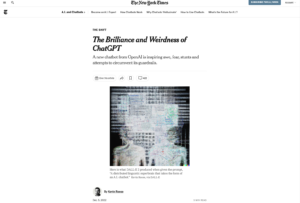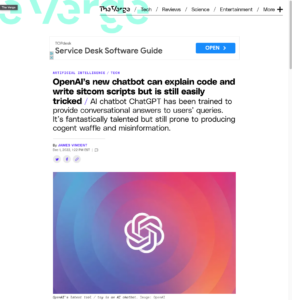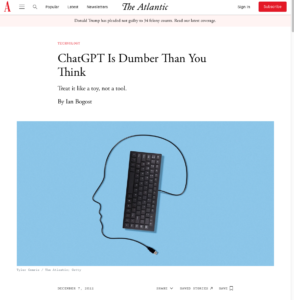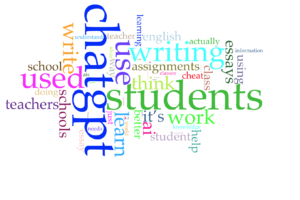Danny Kung
DCI-101
4/14/23
ChatGPT and the Future State of Education
Introduction
Technology has evolved drastically over the past decade. Whether it be faster internet speeds or a new addictive social media platform being introduced, technology and how we define it is constantly evolving. In the past few years, artificial intelligence has come at the forefront of technology as the most powerful and influential companies in the world have been investing billions into this piece of technology. In 2022, ChatGPT came onto the scene as the first majorly popularized artificial intelligence chatbot developed by OpenAI. This tool quickly showed the world how powerful technology had become and what the future of artificial intelligence might look like.
What is Artificial Intelligence?
According to Oxford Languages, artificial intelligence is defined as the theory and development of computer systems able to perform tasks that normally require human intelligence, such as visual perception, speech recognition, decision-making, and translation between languages. The concept and talk around artificial intelligence began around the 1950s with Alan Turing who was a British polymath who explored the mathematical possibility of artificial intelligence. Before 1949, computers were not capable of storing commands, but could only execute them. This changed several years later through the introduction of the Logic Theorist. The Logic Theorist was a program that was designed to imitate the problem solving skills of a human and is considered to be the first artificial intelligence program.
Fast forward to today where we live in an era of “big data” where companies and devices have the capacity and ability to collect enormous sums of information too complicated for a human to process. This has allowed for artificial intelligence to thrive in almost every industry. Take for instance the financial industry. Artificial intelligence can help banks and firms process large volumes of data and predict possible market trends, currency flows, and stock movements. Another example is in marketing. Artificial intelligence marketing tools use customer data and profiles to dive deep into the consumer to learn how to best communicate with them as well as know when and how to tailor specific messages while maximizing efficiency. Artificial intelligence is currently dominating every facet of our life and we don’t even notice it.
Introduction to ChatGPT
History of ChatGPT
ChatGPT, also known as “Chat Generative Pre-trained Transformer”, is a chatbot developed by the company OpenAI that was first released as a prototype on November 30, 2022 for free. OpenAI was founded in December of 2015 in San Francisco and is known as an American artificial intelligence research laboratory focusing on developing a friendly AI. It was cofounded by Sam Altman and Elon Musk in 2015 (Elon later left) and currently is backed by Microsoft. When ChatGPT was first released in 2022, it went viral as a text-based artificial intelligence tool having received billions of dollars in funding from tech investors. On the surface, the platform allows the user to type to type in any question they might have or task they might want to get it done. For instance, it can write a full-blown essay for you or even write lines of code that you can actually run. It was able to give users a tool to quickly find detailed responses on a topic or articulate answers across almost any subject.
Try it out here using this link: https://chat.openai.com
But how does it work? ChatGPT uses a version of OpenAI’s popular language-generation software called GPT-3.5. The software is designed to be able to hold conversations with people and is able to answer follow-up questions, challenge incorrect premises, reject inappropriate queries, admit mistakes when wrong, and a lot more. The software was trained and able to learn how to react on a large data set of text. It was able to learn how to recognize patterns so that it can produce its own text similar to human writing styles.
ChatGPT quickly drew the attention of millions across the world with how powerful the tool seemed to be. However, it quickly went from headlines such as:

to headlines like:


Just as quickly as ChatGPT rose to fame, it also came with users questioning its validity. Concerns were raised almost instantly such as could we possibly rely on a machine to have conversations and generate responses at the completely level of human language and conversation? Ethical concerns were raised such as the possibility of a growing loss of genuine human connection as a result of the product. Besides these ethical concerns, there were also issues with reliability and accuracy. ChatGPT did not always give the correct answer and sometimes struggles with subjective questions. However, as with all good technology, it takes time to develop and grow. OpenAI has recently released GPT-4 as the upgraded version of their software for select users at a paid price.
ChatGPT and Education
So What’s the Problem?
As ChatGPT rose to popularity around the world it quickly began to be used in almost every industry while also facing some sort of pushback within it. Most popularly in the education industry. Students quickly learned that they could use this tool to help answer questions on homework and tests, write detailed essays on any topic, help construct an email or cover letter, and so much more. Questions began to quickly arise highlighted by: what is the point of school (writing essays and taking tests) when a robot can do it for us? Some students didn’t see the need to be able to memorize and regurgitate information they could find in second in the internet. Schools were forced to make swift decisions to respond to the issue of cheating and plagiarism with some “banned” the use of it within their schools. Tools were quickly implemented to detect whether something had been written by ChatGPT and many educators quickly denounced the use of it in education.
Below is a figure I created that is showing the US map with points where school districts have placed some sort of restriction on ChatGPT. That data I used to create the map can be found here:
I created this map in an attempt to see if there was any sort of correlation between what schools had placed restrictions on ChatGPT and the region they were located in within the US. I was surprised by my results as the points show a diverse set of cities scattered across the country, but with clumps in specific regions. In addition, I learned that what I thought initially of as "banning" was defined differently across every school. For example, in Seattle, Los Angeles, and New York City, ChatGPT was defined as "banned" due to its inaccuracies and potential for plagiarism. While in Baltimore, they didn't officially change policies but blocked the website on student devices and computers. In Anchorage, they updated their policies to prohibit students from submitting AI-generated work under their own names. Overall, I was able to learn that there were certain regions that had made adjustments to ChatGPT specifically in the east coast. There were 5 counties within Virginia and Maryland as well as 5 counties in North Carolina and South Carolina who had restrictions against ChatGPT.
What do the Students Think?
One of the articles I was able to find online is a New York Times article that highlights what teenagers think schools should do in reaction to the rise of ChatGPT. The article consists of quotes from 21 high school students across the world and their opinions on whether schools should ban the tool or not are mixed. Below you can find a visualization depicting the words that were most commonly used by the students in the quotes within the article. Some of the words that pop out to me are "cheat", "learn", "help", and "think".

Looking deeper into specific quotes by the students, I was able to see the unique and diverse perspectives among them. One student named Henry from Chicago stated, "In almost all classes in school, ChatGPT should not be used. As it continues to get better and better, ChatGPT will be doing work that the student should do for them." He wasn't the only student who expressed these concerns as Tim from Illinois argued that, "schools should have ChatGPT blocked because it ruins the whole idea of schools. If you want to learn about something related to the assignment then you should probably resort to asking the teacher." On the other hand, many students argued that A.I. is the future and students should get familiar with the technology that will be a part of society. A student from Massachusetts named Whit stated, "It would be very unreasonable to students if their schools completely banned the tool of writing AIs. The reality is that these kids will be experiencing these AIs as they grow older, so the schools should introduce them to the students at a young age." Grange from Chicago also argued that, "I’ve had experience using ChatGPT before and it’s been really helpful for me: When using it for personal questions, joke questions, or help on school assignments, it helps me gather research or understand the topic a lot better and faster … I also find it fun to experiment with, especially as a programmer." Overall, I was able to find that each student had a unique perspective and take on the matter but almost all agreed that ChatGPT and artificial intelligence is here to stay and that the education system has to learn how function beside it.
The Other Side
As mentioned throughout this essay, the release of ChatGPT also resulted in severe backlash from business heads and educators. As with every new piece of technology, concern is at the forefront as we are scared of what we do not know. Yves Normandin is the vice president of AI technologies at Waterfield Tech and has the view that ChatGPT is not ready to be used by businesses. He states that, "there is also little control over what responses the model will generate, and it will often produce, with great confidence, incorrect or nonsensical answers that appear totally plausible” He argues for the inaccuracies ChatGPT produces stating that a business cannot rely on them.
Professors and teachers across the world began voicing their concern worried about the future trustworthiness of written assignments and exams. However, school librarians responded with curiosity about what it could mean for their profession and inside the classroom. One of the articles I read details how even though schools may block the website on their WiFi, most students have phones and just connect to the website without going through the WiFi. ChatGPT will help the schools less funded and with a smaller amount of resources such as a small amount of librarians. The software can also help develop lesson plans to specific standards for teachers or to create plot summaries for readers. Two librarians with the last name Panter and Malespina discuss how they are holding out hope that this may be the technology that finally forces educators to change their assessments of students. Gone are the days of writing a five-paragraph essay so that now students are graded on how much they are learning and the process of it. These two librarians argue for the fact that this technology will change education for the better and that "ignoring ChatGPT is not the answer".
"The technology's here, what are we going to do? We either embrace it—figure out how we use it in our classrooms and how we accept it—or we don't. It's not going to go away. This is going to be the future." - Elissa Malespina (New Jersey high school librarian)
Conclusion
Artificial intelligence tools as powerful as ChatGPT are here, and here to stay. Schools can try to "ban" it and take measures against it, but it will never go away. Students will always find a way to use it. I think that instead of ignoring the fact that ChatGPT is being used by everyone, schools should look to integrate in the curriculum somehow and it take it as a sign of the changing tide within the education system. ChatGPT may be the first, but certainly isn't the last and these artificial intelligence tools are only going to get better and smarter over time. This revolutionary tool has changed the world as we currently know it and the schools that learn how to function beside it will be the ones that are successful.
Annotated Bibliography
Bogost, Ian. “ChatGPT Is Dumber Than You Think.” The Atlantic, 7 Dec. 2022, https://www.theatlantic.com/technology/archive/2022/12/chatgpt-openai-artificial-intelligence-writing-ethics/672386/.
"ChatGPT Is Banned by These Primary and Secondary Schools.” Voicebot.Ai, 9 Feb. 2023, https://voicebot.ai/2023/02/09/chatgpt-is-banned-by-these-primary-and-secondary-schools/.
“ChatGPT.” Wikipedia, 17 Feb. 2023. Wikipedia, https://en.wikipedia.org/w/index.php?title=ChatGPT&oldid=1139924984.
Kay, Grace. “The History of ChatGPT Creator OpenAI, Which Elon Musk Helped Found before Parting Ways and Criticizing.” Business Insider, https://www.businessinsider.com/history-of-openai-company-chatgpt-elon-musk-founded-2022-12. Accessed 17 Feb. 2023.
Klie, Leonard. “OpenAI Introduces ChatGPT, a New Al Chatbot Model.” Customer Relationship Management: CRM, vol. 27, no. 1, Feb. 2023, pp. 10–11.
Roose, Kevin. “Don’t Ban ChatGPT in Schools. Teach With It.” The New York Times, 12 Jan. 2023. NYTimes.com, https://www.nytimes.com/2023/01/12/technology/chatgpt-schools-teachers.html.
Rudolph, Jürgen, et al. “ChatGPT: Bullshit Spewer or the End of Traditional Assessments in Higher Education?” Journal of Applied Learning and Teaching, vol. 6, no. 1, 1, Jan. 2023. journals.sfu.ca, https://doi.org/10.37074/jalt.2023.6.1.9.
SITNFlash. “The History of Artificial Intelligence.” Science in the News, 28 Aug. 2017, https://sitn.hms.harvard.edu/flash/2017/history-artificial-intelligence/.
Vanian, Jonathan. “Why Tech Insiders Are so Excited about ChatGPT, a Chatbot That Answers Questions and Writes Essays.” CNBC, 13 Dec. 2022, https://www.cnbc.com/2022/12/13/chatgpt-is-a-new-ai-chatbot-that-can-answer-questions-and-write-essays.html.
What Students Are Saying About ChatGPT – The New York Times. https://www.nytimes.com/2023/02/02/learning/students-chatgpt.html?searchResultPosition=3. Accessed 17 Feb. 2023.
Yorio, Kara. “The ChatGPT Revolution: School Librarians Explore New AI Technology. Will It Dramatically Change Education?” School Library Journal, vol. 69, no. 2, Feb. 2023, p. 10.
